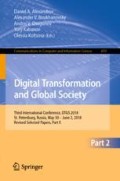Abstract
The paper is based on the experience of an ongoing project ‘Monitoring and prevention of antisocial behaviour of the young people based on Big Data and communication in social networks’ which is created and implemented by the authors with the aim to prevent politically and socially destructive behaviour of the Russian adolescences based on Big Data and the mediation in social networks. We describe the three stages of the project: educational (preparatory-organizational), analytical (information-prognostic) and mediating (social-pedagogical); and introduce the system ‘Social-political insider’ for the collecting, processing and the sentiment analysis of the data about the sphere of the interests, the interest groups, subcultures that are in high demand among the young people. Then we discuss the preliminary results of the first, educational, stage of the project and the special knowledge and skills which are essential for the project team. The importance of such projects which can create the well-trained teams of the professionals and to organize monitoring and modification of the social and political behaviour of young people on a systematic basis is emphasized at the state level as one of the tasks of the state youth policy.
Access this chapter
Tax calculation will be finalised at checkout
Purchases are for personal use only
Notes
- 1.
- 2.
Questions, addressed to one of the authors of this paper by the Director for Security and Online Harms in the Department for Culture, Media and Sport of the British government, Sarah Connolly, during the meet-up and the expert interview in the University of Cambridge in March 2018.
- 3.
References
Ackerman, S.: Egypt’s internet shutdown can’t stop mass protests. Wired (2011). http://www.wired.com/dangerroom/2011/01/egypts-internet-shutdown-cant-stop-mass-protests/
Boyd, D., Ellison, N.: Social network sites: definition, history, and scholarship. J. Comput.-Mediated Commun. 13(1) (2017). Article 11. http://onlinelibrary.willey.com/doi/10/1111/j.1083-6101.2007.00393.x/full
General election 2017: what caused Labour’s youth vote surge? BBC News Online, 16 June 2017 (2017). http://www.bbc.com/news/uk-politics-40244905
Gorbachev, A.M.: Big Data kak instrument protivodejstvija ugrozam jekstremizma. Mezhdunarodno-pravovye sredstva protivodejstvija terrorizmu v uslovijah globalizacii. Problemy terroristicheskogo naemnichestva sredi molodezhi i puti ih preodolenija. Sbornik materialov vserossijskoj konferencii. Stavropol’skij gosudarstvennyj pedagogicheskij institute, pp. 15–17 (2016)
Gricenko, R.A., Prokopchuk, D.D., Tancura, M.S.: Ispol’zovanie «Big Data» v prikladnom politicheskom analize. Voprosy nacional’nyh i federativnyh otnoshenij 2(37), 85–92 (2017)
Habermas, J.: Political communication in media society: does democracy still enjoy an epistemic dimension? The impact of normative theory on empirical research. Commun. Theory 16(4), 411–426 (2006). https://doi.org/10.1111/j.1468-2885.2006.00280.x
Heverin, T., Zach, L.: Microblogging for crisis communication: examination of Twitter use in response to a 2009 violent crisis in the Seattle-Tacoma, Washington area. In: Proceedings of the 7th International ISCRAM Conference, Seattle, USA (2010). https://doi.org/10.1002/1944-2866.POI335
Huang, E.: What you need to know about China’s VPN crackdown Quartz, 12 July 2017 (2017). https://qz.com/1026064/what-you-need-to-know-about-chinas-vpn-crackdown/
Il’jasova, NJu, Kuprijanov, A.V., Popov, S.B., Paringer, R.A.: Osobennosti ispol’zovanija tehnologij Big Data v zadachah medicinskoj diagnostiki. Sistemy vysokoj dostupnosti 12(1), 45–52 (2017)
Kaplan, C.: Twitter terrorists, cell phone jihadists and citizen bloggers: the “global matrix of war” and the biopolitics of technoculture in Mumbai. Theory Cult. Soc. 26(7–8), 1–14 (2009). http://journals.sagepub.com/doi/abs/10.1177/0263276409349281
Karatgozianni, A., Kuntsman, A. (eds.): Digital Cultures and the Politics of Emotion: Feelings, Affect and Technological Change. Palgrave Macmillan, Basingstoke and New York (2012)
Karatzogianni, A.: The Politics of Cyberconflict. Routledge, London and New York (2006)
Kazakov, R.I.: Tehnologii Big Data v upravlenii krupnymi bankami. Biznes-obrazovanie v jekonomike znanij 2(2), 19–22 (2015)
Kolpakova, M., Nikiporets-Takigawa, G.: Archetypal patterns of youth in Russia in the continuum of socio-political formations. Contemporary Probl. Soc. Work 1(4), 76–80 (2015). https://doi.org/10.17922/2412-5466-2015-1-4-9-12
Kuntsman, A.: Online memories, digital conflicts and the cybertouch of war. Digital Icons: Studies in Russian, Eurasian and Central European New Media 4, 1–12 (2010). http://www.digitalicons.org/wp-content/uploads/issue04/files/2010/11/Kuntsman-4.12.pdf
Labour is winning the election on social media. Campaign, 07 July 2017. https://www.campaignlive.co.uk/article/labour-winning-election-social-media/1435748. Accessed 07 June 2017
Livingstone, S.: On the mediation of everything. J. Commun. 59(1), 1–18 (2009). https://doi.org/10.1111/j.1460-2466.2008.01401.x
Mal’ceva, A.V., Mahnytkina, O.V., Shilkina, N.E.: Izuchenie povedencheskih patternov pol’zovatelej social’nyh setej: vozmozhnosti Big Data. Zhizn’ issledovanija posle issledovanija: kak sdelat’ rezul’taty ponjatnymi i poleznymi. VI Sociologicheskaja Grushinskaja konferencija. Moskva. Izd-vo RANHiGS, pp. 988–991 (2016)
Mercea, D.: Digital prefigurative participation: the entwinement of online communication and offline participation in protest events. New Media Soc. 14, 153–169 (2010). http://journals.sagepub.com/doi/10.1177/1461444811429103
Meshherjakov, I.S.: Tehnologii Big Data v dejatel’nosti organov gosudarstvennoj vlasti. Obrazovanie i nauka kak strategicheskie resursy razvitija sovremennogo gosudarstva: sbornik nauchnyh trudov. Saratov: Povolzhskij in-t upr. im. P. A. Stolypina - fil. RANHiGS, pp. 123–125 (2017)
Nikiporets-Takigawa, G., Pain, E.: Internet and Ideological Movements in Russia. NLO, Moscow (2016)
Pochepcov, G.G.: Informacionnye vojny. Refl-buk, Moskva (2000)
Shveits, M.: Internet: konets svobody i anonimnosti (2012). http://www.polit.ru/article/2012/12/04/www_blackout/
Sizov, I.A.: Big Data - bol’shie dannye v biznese. Ekonomika. Biznes. Informatika 3, 8–23 (2016). https://doi.org/10.19075/2414-0031-2016-5-36-44.4
Smirnov, V.A.: Kontury novoj modeli sociologicheskogo analiza jeffektivnosti molodezhnoj politiki s ispol’zovaniem «Big Data». Aktual’nye problemy sociologii kul’tury, obrazovanija, molodezhi i upravlenija. Materialy Vserossijskoj nauchno-prakticheskoj konferencii s mezhdunarodnym uchastiem (Ekaterinburg, 24–25 fevralja 2016 g.) S. 918–923 (2016)
Telegram tells Rudaw it has not closed any accounts, including KDPI on Iran’s demand. Rudaw.net, 02 January 2016 (2016)
Terent’eva, E.I., Morbah, E.S., Vozgrina, A.V.: Sposoby primenenija Big Data dlja PR-zadach. Nauka-Rastudent.ru 3(17) (2016)
Ukaz Prezidenta RF «Ob utverzhdenii Doktriny informacionnoj bezopasnosti Rossijskoj Federacii» № 646 ot 05.12.2016. Sobr. zakonodatel’stva Ros. Federacii. № 50 (2016)
Vasil’eva, E.N., Cynarjova, N.A.: Informacionnaja vojna v kontekste teorii massovoj kommunikacii. Vestnik Tverskogo gosudarstvennogo universiteta. Serija: Filologija, N. 3, S. 117–122 (2017)
Author information
Authors and Affiliations
Corresponding author
Editor information
Editors and Affiliations
Rights and permissions
Copyright information
© 2018 Springer Nature Switzerland AG
About this paper
Cite this paper
Nikiporets-Takigawa, G., Lobazova, O. (2018). Big Data Analysis of Young Citizens’ Social and Political Behaviour and Resocialization Technics. In: Alexandrov, D., Boukhanovsky, A., Chugunov, A., Kabanov, Y., Koltsova, O. (eds) Digital Transformation and Global Society. DTGS 2018. Communications in Computer and Information Science, vol 859. Springer, Cham. https://doi.org/10.1007/978-3-030-02846-6_15
Download citation
DOI: https://doi.org/10.1007/978-3-030-02846-6_15
Published:
Publisher Name: Springer, Cham
Print ISBN: 978-3-030-02845-9
Online ISBN: 978-3-030-02846-6
eBook Packages: Computer ScienceComputer Science (R0)

